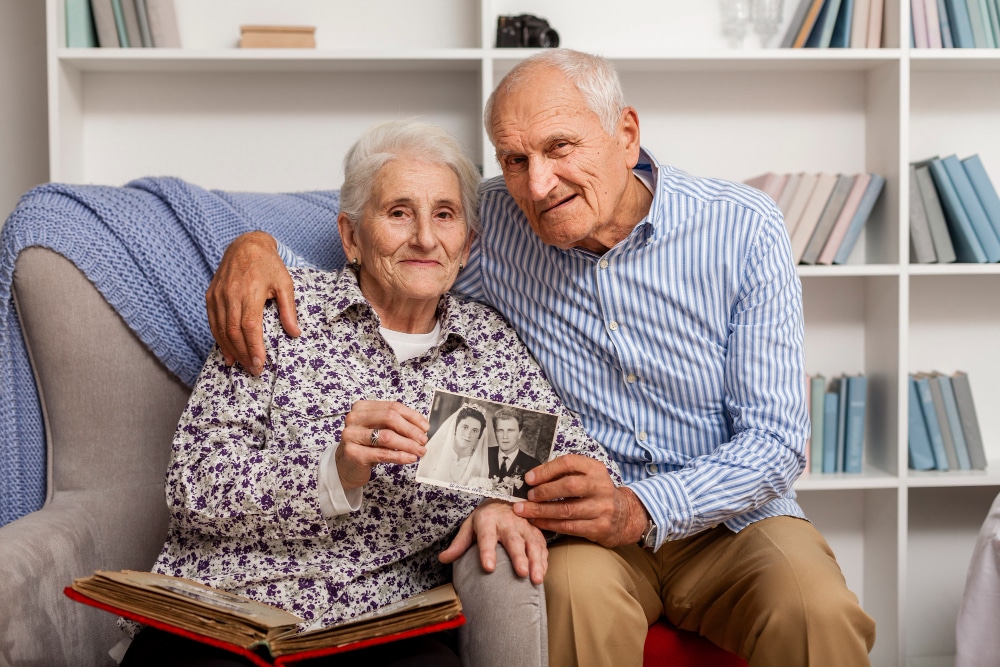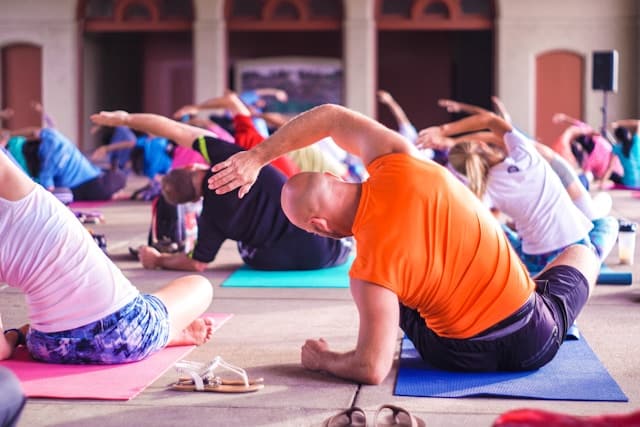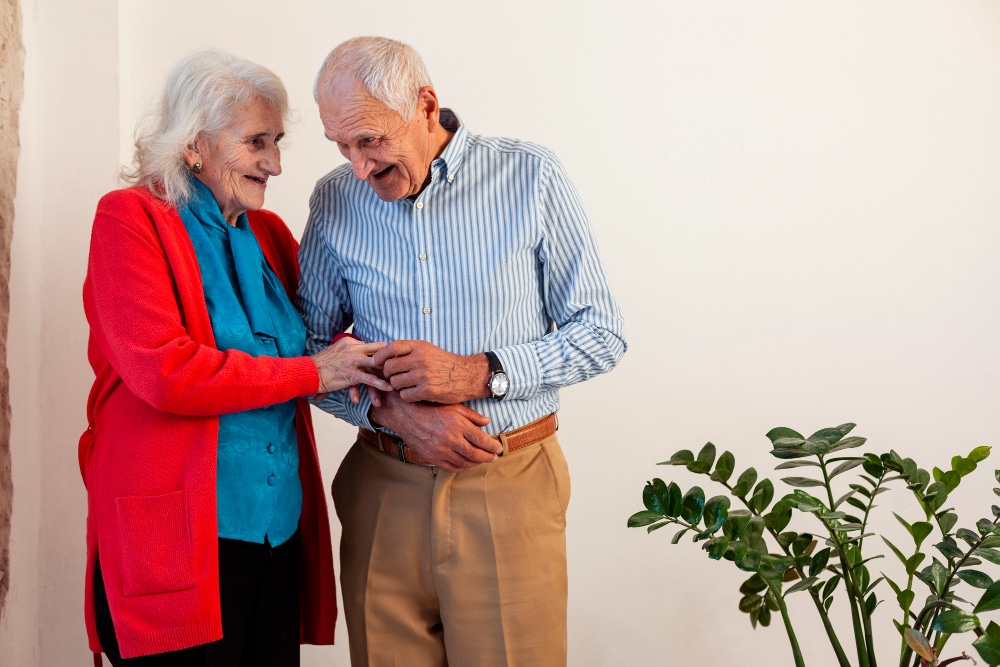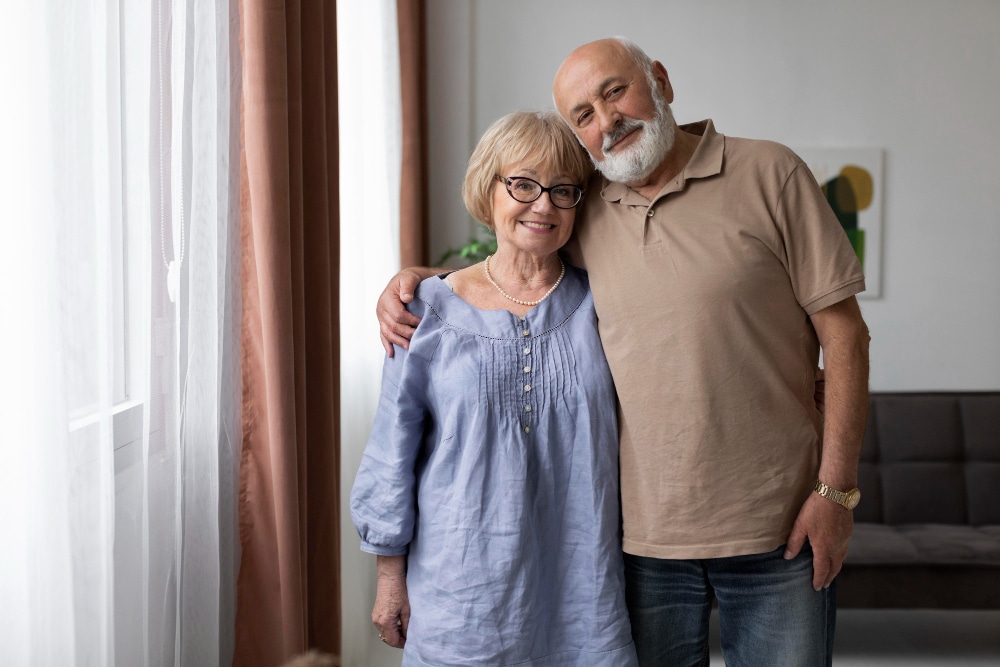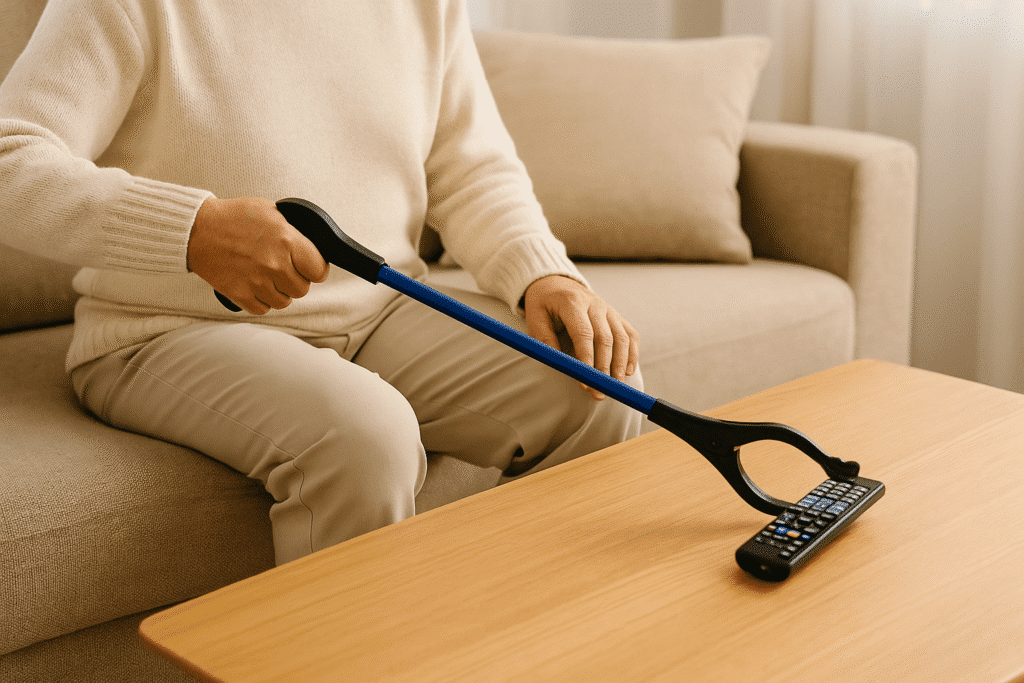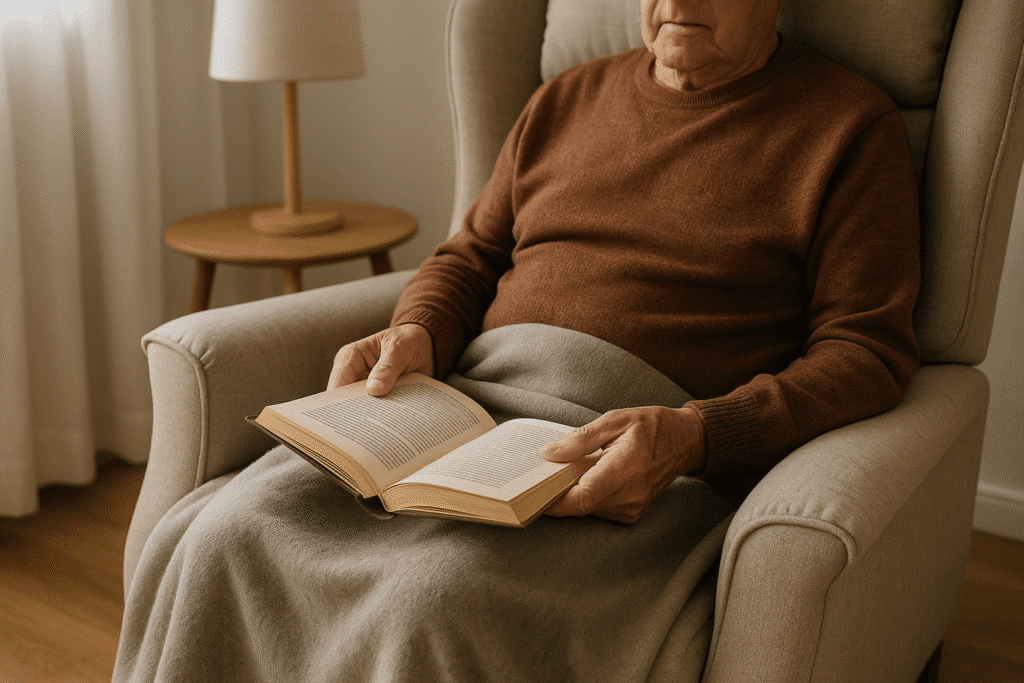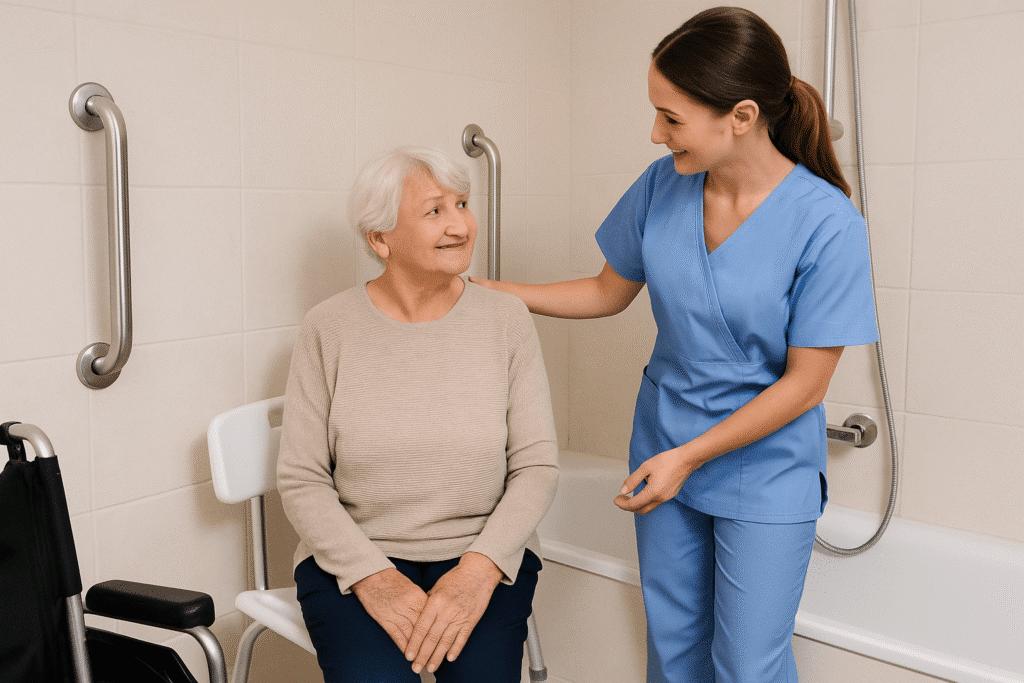Getting older doesn’t mean giving up your independence; it means finding smarter ways to stay healthy, connected, and active.
In fact, according to the CDC, about 80% of older adults have at least one chronic health condition, but daily lifestyle choices can make a huge difference in quality of life.
Whether you’re aging at home or helping a loved one do the same, these daily living tips support physical strength, emotional wellness, and confidence in everyday routines.
TL;DR
Older adults can stay independent and healthy by building small daily habits that support movement, nutrition, rest, safety, and joy. Staying active boosts strength and balance. Eating well fuels energy and supports immune health. Quality sleep helps the body recharge. A safer home reduces fall risks. And finding joy through hobbies, learning, or connection adds purpose and happiness to everyday life.
Physical Health and Energy
To stay physically healthy in older age, focus on regular movement, balanced nutrition, quality sleep, and maintaining a healthy weight. These daily habits can help prevent disease, boost energy, and make daily tasks easier to manage.
1. Stay Active Daily
Staying active helps older adults maintain strength, mobility, and independence.
You don’t need to run marathons; gentle, regular movement is enough. Walking around the block, light stretching, using a recumbent bike, gardening, or even dancing can all improve circulation, joint flexibility, and mood.
According to the National Institute on Aging, physical activity also reduces the risk of falls, heart disease, and cognitive decline.
Try this:
- Walk for 10–30 minutes a day at your own pace
- Do chair exercises or yoga if balance is a concern
- Join a community center or senior fitness class
- Use music to make movement fun
Staying active also supports balance and posture, which is especially helpful for fall prevention. If mobility is limited, start with seated stretches or resistance bands. Any movement is better than none.
Read more: Best under-desk ellipticals for seniors
2. Eat a Balanced, Senior-Friendly Diet
Eating well supports energy, immune strength, and overall wellness.
As we age, our nutritional needs change. Metabolism slows, appetite may decrease, and chewing or digestion might become more sensitive. A senior-friendly diet emphasizes:
- Fresh fruits and vegetables
- Whole grains (like oats, brown rice, quinoa)
- Lean protein (fish, chicken, beans, tofu)
- Healthy fats (olive oil, nuts, avocado)
- Low sodium and added sugars
Helpful habits:
- Eat small, frequent meals if you feel full quickly
- Use herbs and spices instead of salt for flavor
- Choose calcium-rich foods for bone health (e.g., yogurt, leafy greens)
- Stay hydrated, sip water throughout the day
According to the Mayo Clinic, proper nutrition can help manage blood pressure, cholesterol, and diabetes. If you struggle with meal prep, consider simple one-pot meals or senior meal delivery services.
Read more: How to increase appetite in elderly
3. Prioritize Rest and Sleep
Sleep helps the body repair and the mind reset.
Older adults often face changes in sleep patterns, waking up early, trouble falling asleep, or lighter sleep stages. But poor sleep can affect memory, mood, and immune health.
Aim for 7 to 9 hours of sleep per night.
To improve sleep quality:
- Stick to a consistent bedtime and wake-up time
- Avoid caffeine, alcohol, and screen time in the evening
- Use soft lighting and a cool, quiet bedroom
- Try reading or listening to calming music before bed
If you wake up frequently during the night or feel tired during the day, talk to your doctor. Sleep issues may be linked to medications or sleep disorders like apnea.
Read more: Best adjustable beds for seniors
4. Maintain a Healthy Weight
A healthy weight supports mobility, balance, and reduces strain on the heart and joints.
Weight can shift naturally with age due to muscle loss and a slower metabolism. But both excess weight and unintended weight loss can signal health issues.
Tips to manage weight:
- Combine movement and mindful eating
- Avoid skipping meals to prevent overeating later
- Focus on nutrient-dense foods over calorie-dense ones
- Use smaller plates or pre-portion snacks to avoid overeating
Regular check-ins with your healthcare provider can help monitor your weight and adjust your diet or activity level. If you notice changes in appetite or sudden weight gain/loss, seek medical advice to rule out underlying causes.
Read more: Best treadmills for seniors
Emotional and Mental Well-Being
Supporting emotional and mental health in older age includes staying socially connected, keeping your mind stimulated, practicing daily self-care, and managing stress gently. These habits can reduce loneliness, boost mood, and support long-term brain health.
5. Stay Connected with People
Social connection is vital for emotional health and longevity.
Loneliness can affect both mind and body, raising risks of depression, memory decline, and heart issues. Even a few minutes of meaningful interaction per day can improve mood and self-worth.
Ways to stay social:
- Call or video chat with friends and family
- Join local clubs, book groups, or activity centers
- Attend religious services or community events
- Use social media or senior-friendly apps to stay in touch
If mobility is a barrier, look into local programs that offer home visits or transportation assistance. Virtual senior centers and online meetups are also growing in popularity.
6. Keep Your Mind Active
An engaged mind stays sharper for longer.
Cognitive stimulation supports memory, learning, and problem-solving skills. Regular mental challenges can even delay the signs of dementia or age-related decline.
Brain-boosting activities include:
- Crossword puzzles, Sudoku, or trivia games
- Reading books, listening to audiobooks, or podcasts
- Learning a new skill, language, or hobby
- Playing strategy-based or memory games, including video games
According to Harvard Health, engaging your brain regularly can create new neural pathways, helping to preserve mental agility well into your 70s and 80s.
7. Practice Daily Self-Care
Self-care means doing things that make you feel calm, capable, and fulfilled.
Older adults often spend years caring for others. Now’s the time to make space for yourself, without guilt. Whether it’s quiet time, creative hobbies, or gentle routines, self-care builds emotional resilience.
Ideas for daily self-care:
- Enjoy a morning routine with tea and music
- Write in a journal or gratitude notebook
- Pamper yourself with a warm bath or gentle massage
- Spend time outdoors or sit in the sun for a few minutes
Self-care isn’t selfish. It’s a foundation for living with energy and intention.
8. Manage Stress Gently
Stress can sneak up, especially with health concerns or life transitions.
Learning to manage it can protect your heart, improve sleep, and lift your mood. The goal isn’t to eliminate stress completely, just to handle it with more ease.
Gentle stress relief techniques:
- Deep breathing: Inhale for 4, hold for 4, exhale for 4
- Meditation: Even 5 minutes a day can calm the mind
- Light stretching or tai chi to release tension
- Listen to calming music or nature sounds
- Talk it out with a friend or support group
If stress feels overwhelming or turns into anxiety or depression, reach out to a healthcare provider or counselor. Support is always available.
Home Safety and Independence
To stay independent at home, older adults should prevent fall risks, use assistive tools, keep their space organized, and consider a medical alert system. These simple upgrades make daily activities safer and more manageable, supporting long-term independence.
9. Prevent Falls and Trips
Falls are the leading cause of injury among older adults, but many can be prevented with a few home modifications. The CDC reports that 1 in 4 adults aged 65+ falls each year. To lower this risk:
Make your home safer by:
- Removing loose rugs or securing them with non-slip pads
- Keeping walkways and stairs clear of clutter
- Adding grab bars in bathrooms and near stairs
- Installing nightlights in bedrooms, hallways, and bathrooms
- Wearing supportive, non-slip footwear indoors
Fall prevention starts with visibility, stability, and easy access to the things you use most. If balance is a concern, talk to your doctor about getting a fall risk assessment or physical therapy.
10. Use Helpful Tools and Aids
Assistive tools can make everyday tasks easier and safer.
As mobility or grip strength changes, tools like a reacher, a can opener, and a raised toilet seat can make daily tasks easier while helping seniors maintain independence.
Common tools that help:
- Reachers and grabbers to avoid bending
- Long-handled shoehorns and dressing aids
- Non-slip bath mats and shower chairs
- A cane, walker, or walker with seats can provide extra balance
- Raised furniture, recliners with lift assist, or bed risers for easier transfers
Using aids isn’t a sign of weakness; it’s a smart way to keep doing what you love while staying safe and comfortable.
11. Organize Your Space
An organized home reduces confusion, frustration, and fall risks. As eyesight or memory changes, a well-structured home setup makes everyday routines smoother.
Try these organization tips:
- Label shelves and containers in large, clear print
- Keep frequently used items at waist height
- Use color-coded keys or remote controls
- Install lazy Susans in cabinets to easily reach items
- Declutter regularly, less mess equals less stress
Simple systems like checklists or wall calendars can also help with routines and reminders.
12. Consider a Medical Alert System
Medical alert systems provide peace of mind and instant access to help.
If a fall or emergency happens, having a wearable device that connects to emergency services can be life-saving, especially for those living alone.
What to look for in a system:
- Fall detection and automatic alerts
- 24/7 monitoring with trained responders
- GPS tracking (for active seniors)
- Waterproof design for shower use
- Comfortable wearable options (necklace or wristband)
Today’s systems are more discreet and user-friendly than ever. Many also integrate with smart home devices or apps for added safety features.
Health and Wellness Routines
Maintaining health in older age includes scheduling regular medical checkups, managing medications properly, and staying hydrated, especially in warmer months. These habits support long-term wellness and help catch small issues before they become serious.
13. Schedule Regular Checkups
Preventive care keeps you ahead of potential health issues.
As we age, routine screenings, blood work, and physical exams become more important. Even if you feel well, your doctor can detect early signs of conditions like high blood pressure, diabetes, or vision decline.
Health maintenance tips:
- Visit your primary doctor at least once a year
- Get routine eye and dental checkups
- Stay updated on vaccines (e.g., flu, pneumonia, shingles)
- Track cholesterol, blood sugar, and bone density regularly
Keep a medical folder or digital log with your records, appointment dates, and test results for easy reference.
14. Manage Medications Wisely
Medication safety is crucial as prescriptions increase. Taking the wrong dose or mixing medications accidentally can lead to serious side effects. Organization is key.
Best practices for managing medications:
- Use a weekly pill organizer
- Set alarms or phone reminders
- Keep an up-to-date list of all medications and dosages
- Review all prescriptions with your doctor or pharmacist every 6–12 months
If remembering doses becomes difficult, consider automatic dispensers or help from a caregiver or family member.
15. Hydrate and Watch for Heat Risks
Older adults are more prone to dehydration and heat-related illness. As we age, the sensation of thirst often decreases, even when the body needs water.
Tips to stay hydrated and cool:
- Drink water throughout the day, even without thirst
- Eat water-rich foods like cucumbers, watermelon, and soup
- Avoid caffeinated and sugary drinks in excess
- Dress in breathable, lightweight clothing during warm weather
- Stay indoors during peak heat hours and use fans or air conditioning
Watch for signs of dehydration such as dry mouth, dizziness, or dark-colored urine. When in doubt, drink a glass of water and rest in a cool area.
Finding Joy in Everyday Life
Finding joy later in life includes doing small things you love, exploring new interests, and sharing your time or stories with others. Joy fuels emotional wellness and gives each day purpose and meaning.
16. Do One Thing You Enjoy Each Day
Joy is a daily habit, not a luxury. Hobbies, small rituals, or quiet moments can uplift your mood and improve overall health.
Studies show that older adults who engage in daily enjoyable activities report better cognitive and emotional well-being.
Simple joys to try:
- Reading a favorite book with tea
- Listening to music from your youth
- Working in the garden or caring for plants
- Watching birds or cloud-gazing from a porch
It doesn’t have to be big. Even 10–15 minutes of doing what you love can reset your mindset for the whole day.
17. Try Something New
New experiences stimulate the brain and spark excitement. You’re never too old to learn, create, or explore. Whether it’s a new recipe, a local class, or a virtual museum tour, novelty keeps life interesting.
Ideas to explore:
- Take an art, language, or music class (online or local)
- Try a new recipe once a week
- Explore a local walking path or museum
- Play new games or use learning apps for seniors
Learning something new builds confidence and opens doors to new social connections too.
18. Give Back or Share Your Wisdom
Sharing your time or experience creates a sense of purpose. Older adults have a lifetime of stories, skills, and insights. Volunteering, mentoring, or simply connecting with others helps strengthen communities and improves self-worth.
Ways to give back:
- Volunteer at a local library, food pantry, or school
- Offer to mentor younger generations or teach a skill
- Start a gratitude or life story journal
- Create video messages or written letters for family
Even a small act of kindness, like helping a neighbor or calling a friend, can brighten your day and theirs.
Conclusion
Staying healthy, happy, and independent as you age isn’t about perfection; it’s about small, consistent choices. From daily movement and nourishing meals to safe home setups and social connections, each habit plays a role in your well-being.
These 18 daily living tips are designed to support the whole person: body, mind, and spirit. Whether you’re adding more movement, organizing your space, or finding joy in something new, the key is to keep moving forward with intention.
You don’t need to make every change at once. Start with one area, like staying active or improving sleep, and build from there.
With the right support and a few thoughtful routines, growing older can be a rewarding and empowered chapter of life.
FAQs
What are some simple daily tips to stay active as an older adult?
Older adults can stay active by taking short daily walks, doing light stretching or chair yoga, and engaging in fun activities like gardening or dancing. Even 10–15 minutes of gentle movement can improve balance, energy, and mood.
How can older people eat well every day without cooking complex meals?
Seniors can eat well with simple meal ideas like oatmeal with fruit, vegetable soups, or lean protein with steamed vegetables. One-pot meals, slow cookers, and batch cooking can also make healthy eating easier without long prep times.
What can seniors do to avoid feeling lonely?
To avoid loneliness, older adults can connect with family or friends by phone, join local clubs or online groups, attend community events, or volunteer. Staying socially engaged improves emotional health and reduces the risk of isolation.
How can I make my home safer as I age?
You can make your home safer by removing loose rugs, improving lighting, installing grab bars in bathrooms, and using non-slip mats. Keep walkways clear and place everyday items within easy reach to reduce the risk of trips and falls.
Are there easy ways for seniors to keep track of medications?
Yes, seniors can use weekly pill organizers, phone alarms, or automatic dispensers to manage medications. Keeping a written list of prescriptions and reviewing it with a doctor regularly can also help prevent errors or missed doses.
Mark has over 10 years of hands-on experience in senior care. He founded ElderSavvy to provide honest, easy-to-follow advice on tools that support comfort, safety, and independence. Mark oversees all content and product reviews, guided by insights from caregivers, health professionals, and real-life use.

